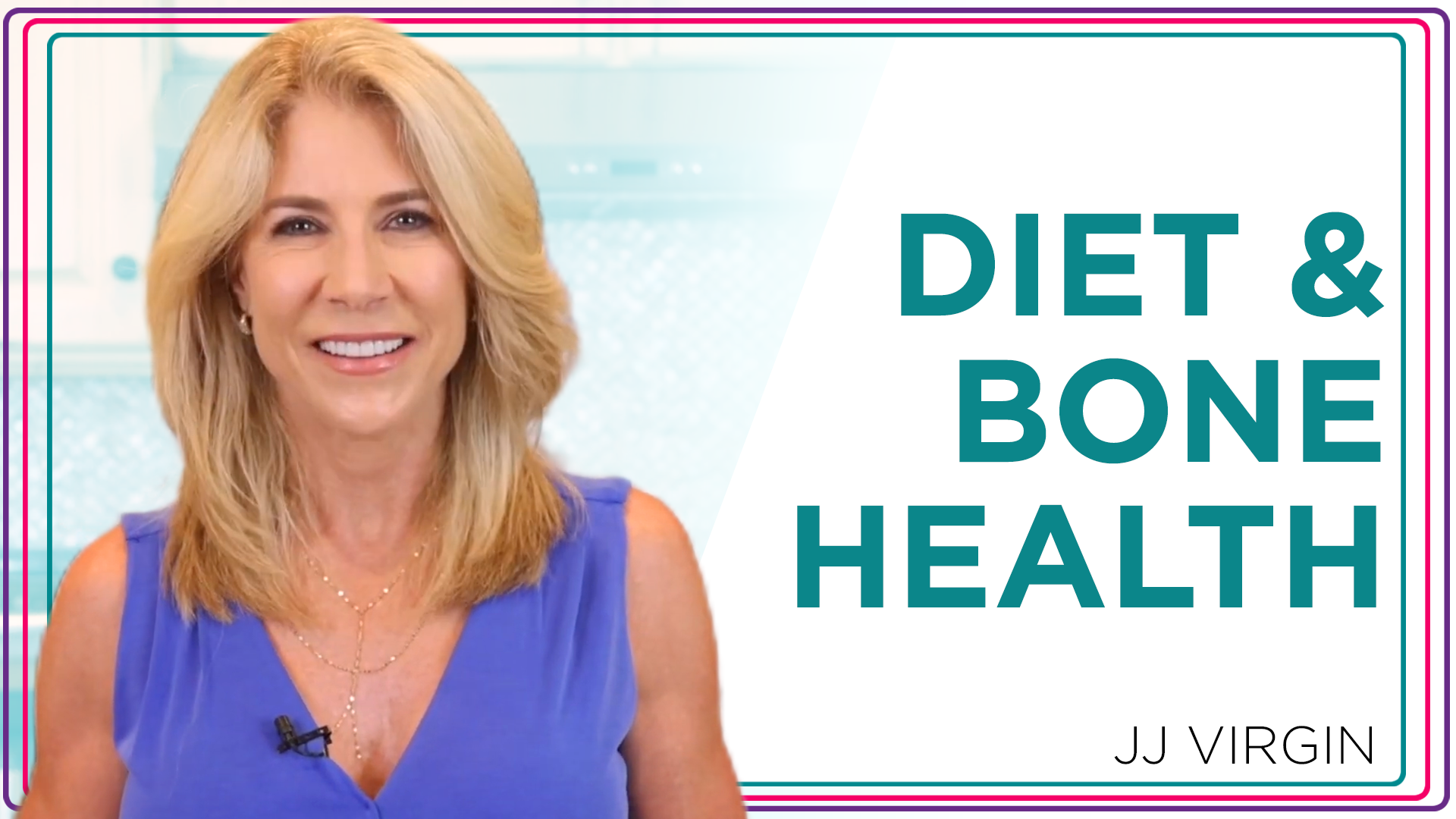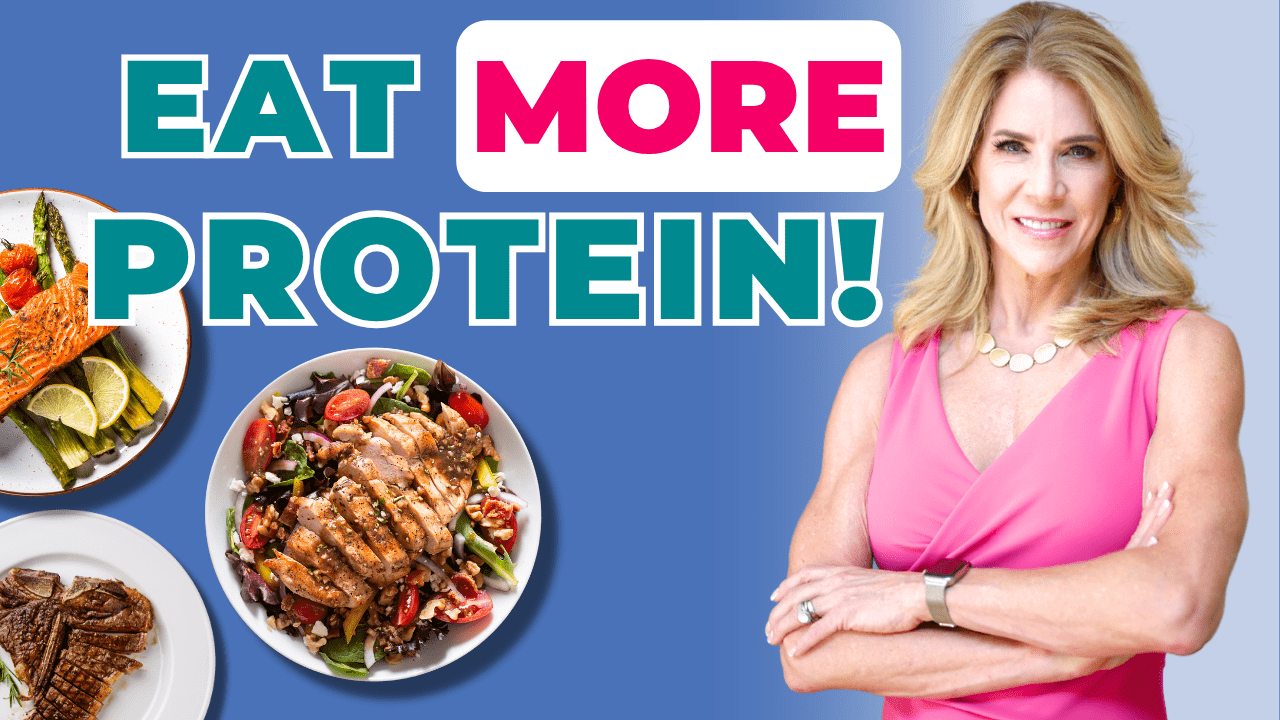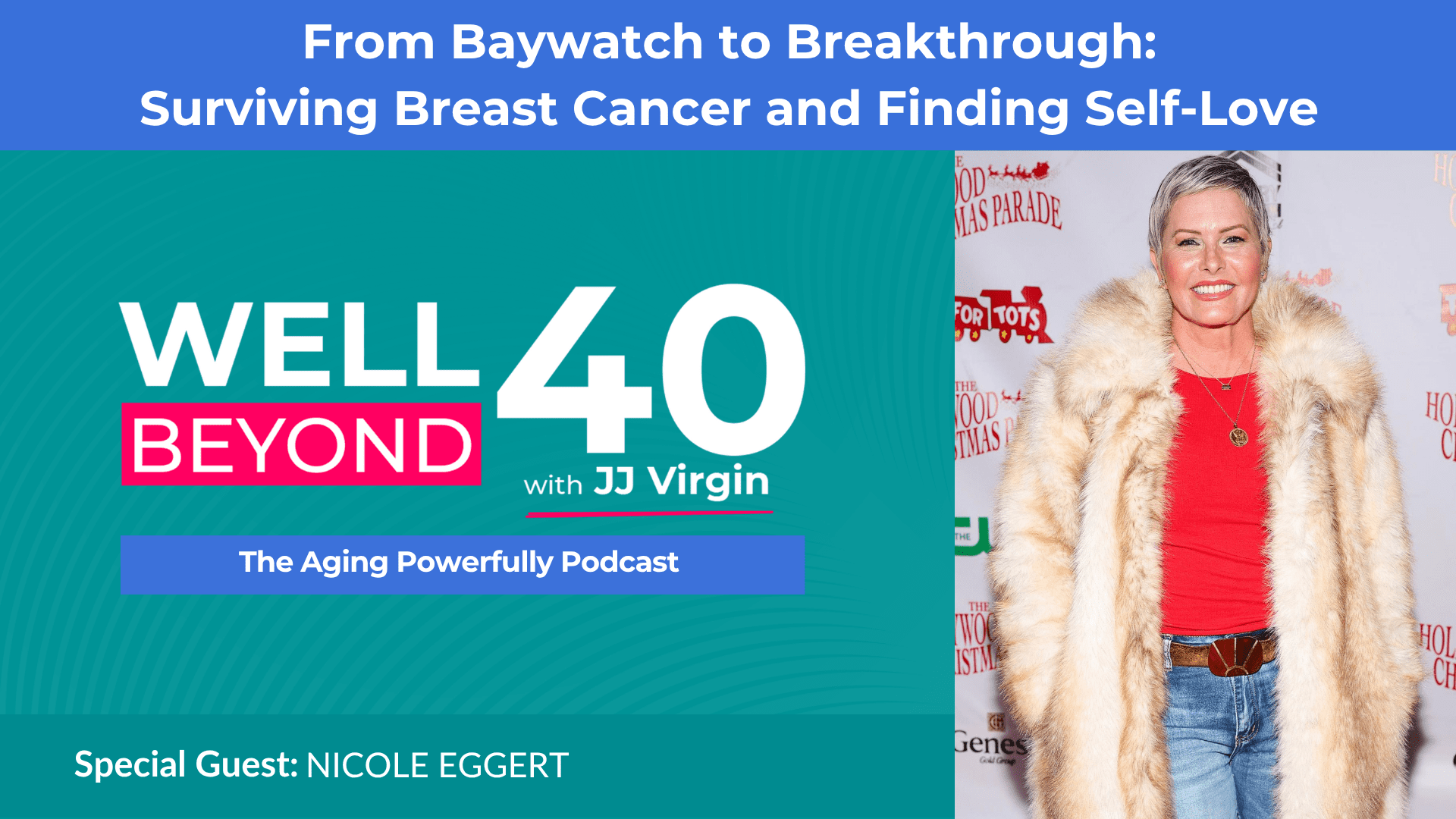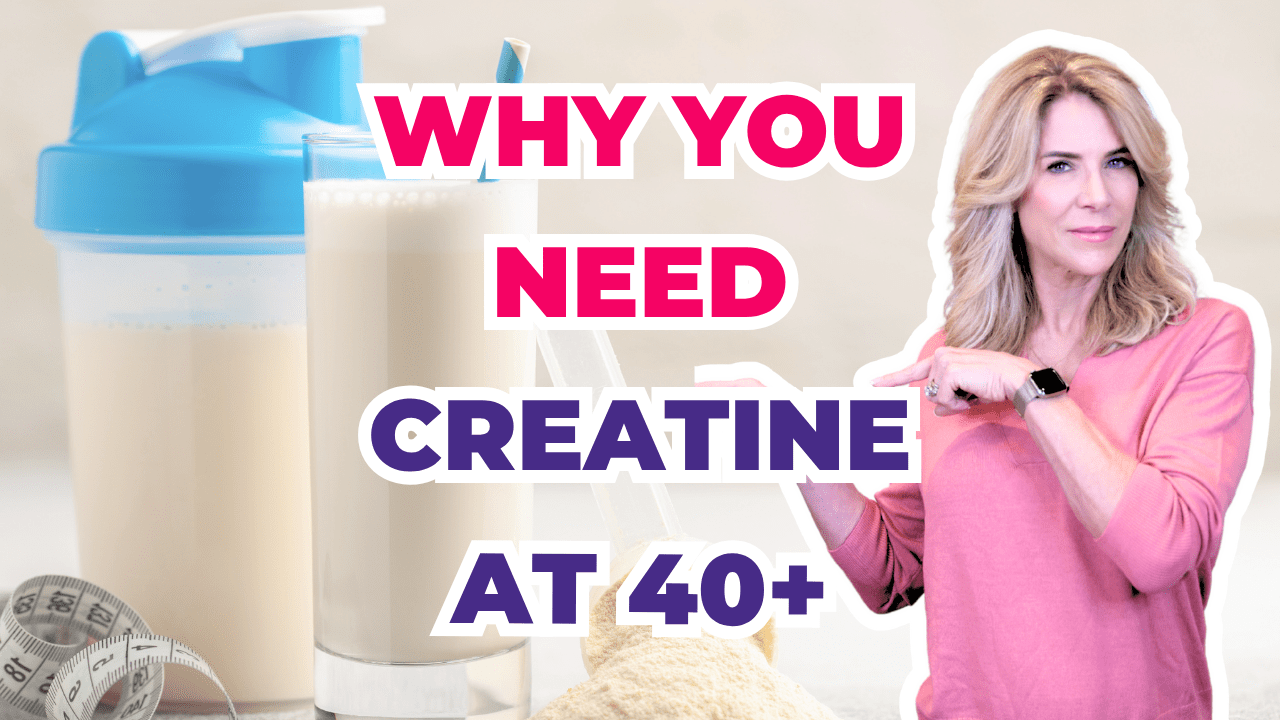How to Support Strong Bones & Age Powerfully
Most people don’t give bone health the attention it deserves until it’s too late. But as JJ explains here, being frail, suffering fractures, and getting osteoporosis aren’t inevitable consequences of getting older. In this episode, you’ll learn how to take control of bone health to prevent bone loss, including recognizing the signs and symptoms of osteoporosis. You’ll learn why strong bones are critical for being healthy, why bone loss accelerates after age 50, the risk factors beyond age for bone loss, and why calcium alone isn’t enough for strong bones (and what nutrients you need). JJ also reveals the #1 macronutrient for strong bones that you probably aren’t getting enough of, how weight loss can weaken bone density (and how to prevent that), and the best exercise for maintaining strong bones. Healthy bones are vital for aging powerfully, so don’t miss this information-packed episode to take control of bone health today.
Mentioned in this episode:
Watch the FULL VIDEO on JJ’s Youtube Channel
Learn why so much you’ve been told about dairy is wrong
Add Collagen Peptides Powder to your loaded smoothies
Order a vitamin D test (and other helpful tests) here
Meet your omega-3 fatty acid quota with Omega Plus
Learn effective strategies to build muscle in your 50s (and beyond)
Meet your protein quota easily with our All-In-One Shakes
Learn how to build the perfect plate
Click here for more information and offers from our sponsors
ATHE_Transcript_Ep 473_YT 35
JJ Virgin: [00:00:00] Hey, this is JJ Virgin. Thanks so much for joining me. This is ask the health expert. In each episode, I put the power of health in your hands and share ways to get healthy, lose weight, heal your gut detox and lots more. So you can look and feel better fast if you’d rather watch the video. Hey, I did put on my makeup and do my hair.
So check it out on my YouTube channel.
One of the most important things to think about if you wanna age well, and by that, I mean, if you wanna live not only a long life, but you also wanna be healthy and active, I mean, who doesn’t want that? Right. Well, to make sure that that happens, you have to start paying attention to your bones. Now I’m betting that you haven’t been thinking about your bones at all.
And most people don’t give their [00:01:00] bones any love. Tell us too late. But that doesn’t have to be you, you can get a jump on your healthy future right now with these strategies. I’m about to share, Hey, it’s JJ, have you ever heard that quote that says to succeed in life, you need three things, a wishbone, a backbone, and a funny bone.
It’s pretty good. Right? And there’s some truth in there. Bones are that important. So let me welcome you to another episode in the series on what to. When to eat and why. And in these videos, we’re focusing on addressing different health issues by improving what’s at the end of your fork. And today we’re talking bone health.
Now I’m gonna start with the why, why you need your bones to be strong and healthy. Now you may intuitively know you do. But you probably take them for granted, or you may not think there’s much you can do about it. Well, there is. And having strong and healthy bones gets more and more important as we age.
And of course our [00:02:00] bones help us stand and move, but they also protect our vital organs and store nutrients and minerals that keep us alive. And if we don’t take care of them, our risk of frailty and fracture shoots up as we age. And frankly, that scares me. I’ve heard and seen some really scary stories around people breaking their hip.
And then that’s just it. Now you’ve heard of aging gracefully, and I want you just to like blast that out. We want to age powerfully and you know what you need to age powerfully strong bones. So I’m gonna give you a few more reasons to make your bone health a priority before we get into some pretty easy ways to do it.
So you may not know that bone is living tissue and it’s constantly being broken down and replaced from about the age of 25 to around 50 bone density stays pretty stable, meaning it builds up and breaks down in equal amounts. But after 50 bone breakdown, [00:03:00] outpaces, bone formation and bone loss usually accelerates.
And that’s when you start to hear about osteopenia and osteoporosis and for women, this is even more true around. So age is a risk factor, but so is being underweight or under muscled. And some medications can weaken bones too. Now the estimate is that more than 200 million people have osteoporosis.
That is a crazy number. According to the recent statistics from the international osteoporosis foundation, worldwide one in three women over the age of 50 and one in five. We’ll have fractures related to osteoporosis in their lifetime. And here’s, what’s really challenging. There’s no signs of osteoporosis until you break that bone.
That’ll get your attention right now. Osteoporosis causes bones to become so weak and so brittle. [00:04:00] That a fall or even something crazy, like just bending over or coughing can cause a fracture. Now, basically, if you don’t take care of your bones, they can’t take care of you. And that means that even the simplest things like carrying your groceries can become really hard, are actually dangerous.
So let’s talk what so to make sure that never happens to. There are things that you should do right now, no matter what your age to prevent your bones from getting weak. First, we’re gonna talk about what to eat for strong bones, eating foods that are rich in calcium and vitamin D is really important.
But please, don’t just default to dairy here. Now, if you’ve read the Virgin diet, you know, dairy is one of my seven high-fi high inflammatory foods and is acidic. So by eating it, you may be inviting more problems than you’re solving. Besides, there are foods that have a lot more calcium than dairy does [00:05:00] almonds, kale, bok choy and legumes are all great sources of calcium, but it’s not enough just eat foods high in calcium because you need vitamin D to make calcium as bioavailable as possible.
So your body can actually use it to help your bones. So you gotta make sure your vitamin D level is where it needs to be. And if you’re going through menopause, this is especially important. I’ve looked at a lot of vitamin D tests. And it’s rare that I ever see someone in the ideal range without supplementation.
A lot of people are low in vitamin D and you wanna get yours tested and the test you wanna get is the 25 hydroxy vitamin D test you’ll want your levels to be between 50 to 80 NGS per ML. And if it’s not there, you’re gonna wanna supplement with D3 and vitamins K1 and K2, because vitamin K works synergistically with D to ensure that your calcium gets absorbed.
And then it goes to the right places in your body. Now, also with that calcium, you [00:06:00] need protein for healthy and strong bones. So things like grass fed and finish beef, pastured chicken, Turkey, wild fish. And my favorite of course, I love breaking my fast every day with a smoothie and I’ll use my clean paleo protein with collagen powder.
Collagen by the way is a protein that’s known to support both health bone health. And you can also get that collagen by drinking bone broth. So you wanna make sure that you’re getting protein because protein makes up about 50% of the volume of bone. Now there was a study done in 2018 that followed more than 2,900 seniors over 23 years.
And researchers found that the people who ate the most protein. Were 30% less likely to become functionally impaired than those who ate the least amount. That is huge. And in another study in 2017, researchers followed nearly 2000 older adults over six years. And the people who consumed the least amount of protein [00:07:00] were almost twice as likely to have difficulty walking or climbing the stairs as those who ate the most.
All right. So let’s talk about how much protein you should. And I gotta say too, not only are you eating it, one of the challenges as we age is we don’t digest it well, so we can’t use it well. So also always consider using enzymes, especially betaine to help you digest your protein. But let’s talk about how much protein you should have.
One of the things I really want you to do is to get yourself a body composition scale. So this isn’t just getting on and finding out what your weight is. This scale will tell you what your weight is made up of. How much of your body is fat. You might think, you know, you don’t, unless you test and how much is lean body mass.
We wanna make sure that we’re holding onto and building lean body mass and protein is super important for this. And so I base your protein needs on that. I want you to get at least a gram per pound of lean body mass. So if you are 150 pound woman and your body [00:08:00] fat is 20%, that means that you have 120 pounds of lean body mass.
That means you need 120 grams of protein per day. As your floor, as the least amount divided into three meals. That means you’re getting 40 grams of protein at each meal, or maybe you get 30 and then you get 40 and 50. So again, one 20 would be your minimum there. You, this is 150 pound woman.
You’re probably gonna want to eat more about a gram per pound of whatever your ideal body weight is. So I’m assuming this 150 pound woman at 20% body fat, which would be great is that’s her ideal. So maybe she’s eating 150 grams of protein today. The floor was one 20, she’s going for 150, and then she’s really working on putting on muscle.
Let’s say that 150 pound woman actually. 30% body fat or 40% body fat. She needs to drop some fat. But what she really needs to do is put on some muscle, [00:09:00] then I’m gonna have her. About one and a half grams of protein per pound of ideal body weight. So again, you gotta make sure you’re getting enough protein and you’re dividing between your meals.
Do not fear protein, fear, not getting enough and fear not digesting it. I think we’ve become protein phobic in this country and we’re suffering the consequences. And I say, not on my watch now beyond protein, you also wanna focus on foods high and magnesium. Omega-3 and zinc. These all are critical for supporting healthy bones.
So what does this look like? Fish now, bonus points for you. If you will eat sardines. I wish I could say I did. I do have a great recipe for it in one of my cookbooks, but sardines are fantastic for you cuz you can eat the bones. So if you can do that, a plus also nuts and flax seeds and fish and beans and cruciferous vegetables like broccoli, cabbage and okra.
Because we wanna make sure you’re getting deep green Leafys because of the vitamin K in them. Now I’ve gotta [00:10:00] push out here. Just a little word of caution. So some of the deep green Leafys, like spinach. You can really kind of taste this with spinach. They contain oxalates and the oxalates can interfere with calcium absorption.
So like, don’t go, okay, I’m gonna do my deep green Leafys. And I’m gonna have like five cups of spinach every single day. You know, one of the big, important things that we do in, in health, in your diet, in what to eat is we eat seasonal, local, organic, and we rotate. So don’t eat the same things all the time, but get a lot.
Different deep green leafies and cruciferous vegetables. Super important. Another big benefit from eating your deep green leafies and cruciferous vegetables is they help you maintain a good acid alkaline balance. Now, why is this important? Well, if you’ve got a super acidic diet, you’re eating a lot of animal protein.
You’re drinking your coffee. You’re having your teas. It could be acidic. And if you’re more acidic, your body is actually gonna have to buffer you back to a good acid Aline balance. You know what it does, it can leech some calcium from your bones [00:11:00] to maintain this balance. So we don’t want that to happen.
The easiest solution to this eat more deep greens leafys, eat those non-starchy vegetables, especially the cruciferous ones. And, you know, I always say, I want you to eat minimum five servings of non-starchy vegetables a day. That’s your floor. And 10 is. Kind of goalpost and that’s one of the reasons why, all right, now the next one, this is gonna sound a little weird, but eggshells are a great source of calcium too.
Now, if you are not egg intolerant, you can hard boil your eggs or soft boil your eggs and you’re eating pastured eggs, right? And then you grind up the shells into a powder and you can throw the powder into your smoothie. And apparently you won’t even taste. A full disclosure. This sounds awful to me, so I’ve not done it.
However, I think it’s much easier just to take supplement, right? I do it the easy way. So I have a product called complete bone support. Pretty much says it all. It’s a complete bone support. It’s a vitamin and mineral blend [00:12:00] formulated to support bone strength and health. So includes all of the minerals.
We just talked about calcium, magnesium, and zinc, and also in forms that are well chelated, easy for your body to absorb. That’s really important. And then vitamins, D and K. All of the things we’re talking about here that you need in one supplement. So you don’t have to grind up eggshells and put ’em in your smoothie, although bonus points, if you do.
And if you don’t take mine, find a good one. You like those, all those ingredients to support your bone tissue, but really important here to know when you’re taking minerals, minerals are rocks, they are not easy to absorb. So make sure that you’re getting minerals that are well. That means they are attached to amino acids so
your body can absorb ’em well, okay. The other one that you might want to think about that I’m super keen on something called Annatto-E Tocotrienols. Like is the greatest thing. We actually did a trial with a group of women using Annatto-E GG CoQ10 and dim. [00:13:00] For hormonal support through menopause, annotto-E is this really amazing supplement.
And I love it for 40 plus year old women because it’s cardiovascular protective and brain protective, but it’s also can be really good for bone health. So check that one out too. Now, in addition to these power foods and supplements, let me mention, and I got to right that regular exercise. And when I say regular exercise, I’m talking.
Weight training and resistance training body weight training is super duper important. You wanna load your spine, right? You wanna actually load your spine, push your weights, overhead, do squats. This is really important. Also things like hiking or jogging or climbing stairs, things that have a little bit of impact are really important for your bones.
They’re essential for keeping your bones strong and healthy. Okay. When, so when should you start eating with the focus on your bone? all right, this is pretty easy right now. The sooner you start the better, believe it or not, [00:14:00] even if you’re not perimenopausal, even if you’re in your twenties, your risk can still be high, but of course it’s especially important for women heading into going through or following menopause.
It’s non-negotiable for you. Got it. Now once this, like you start to lose bone and it gets away from you. It is really hard to shift back and then you might end up having to take some horrible medication and I just don’t wanna see that happening to anybody. Okay. So start now. So now you know why you have to eat for your bones.
And you have to eat, right. And whatever you do, I want you to avoid these like low calorie, starvation diets. You wanna be really careful if dieting has become your hobby because rapid weight loss and losing a lot of weight can negatively impact your bone density. Now, if you’re going slow and using diet, like I teach as a therapeutic tool to figure out things about your body, what works, what doesn’t really design that eating plan that will work for you for a lifetime, then.[00:15:00]
Weight loss over time is not gonna hurt your bone marrow density as much, especially if you’re combining it with high intensity resistance and weight bearing exercise. And of course, getting into protein in the collagen that you need super critical adding muscle is gonna help support your bones. And it also helps slow bone loss, which is course is gonna lower your risk of fractures and osteoporosis.
So. Again, I cannot stress it enough. Look into strength or resistance exercises you can easily do at home. And by the way, you could totally do this at home. You can start with just some free weights. And I love using a TRX trainer. And there’s loads on YouTube, where you can see how to use a TRX trainer or hire personal trainer to come over and just design your workout routine for you.
But it’s easy enough to get into that routine of doing resistance training. Walking is not enough here. You’ve got to do some resistance training, and again, it can be using a TRX trainer inexpensive. You could even use water bottles as your weight. And you can [00:16:00] use some of your body weight, but you gotta get going on this.
I’ve spent a load of time in my career, helping people strength train and build muscle for better health. So I know what a difference this can make. And by the way, muscle not only helps protect your bones, right. And lifting weights not only helps with improving bone mineral density, but muscle, of course, I call it the metabolic Spanx.
It’s gonna help with blood sugar balance. It helps boost your metabolism. So it’s huge for a living. A long, healthy life. And again, I want you to stop thinking about, oh, I’m gonna live powerfully. I want you to move from or live gracefully. I want you to start thinking I’m living powerfully. I’m aging powerfully, right?
And muscle is the key to that. Now, if you wanna know more about this, you can click the link below to get your free menopause guide. And hopefully. You don’t have a bone to pick with any of that. I know I had to do it. Okay, boo. Now, even with that groan, I’m still going to ask you to like, [00:17:00] and subscribe. So you don’t miss the next episode on what to eat when to eat and why.
For stress and anxiety, that’s gonna be a big one. I’ll see you there
for more info on this and other health topics I cover or to rate your review. Find me on Instagram, Facebook and my website, JJvirgin.com. And don’t forget to subscribe to my show. So you won’t miss a single episode, go to subscribetojj.com. Thanks again for being with me this week.

 Subscribe to our show
Subscribe to our show 




